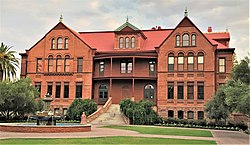 | |
| Type | Public |
|---|---|
| Established | 1984 |
| Dean | Dr. Todd Sandrin |
| Students | 2700 |
| Location | , , United States 33°36′30″N112°09′36″W / 33.608378°N 112.15988°W |
| Campus | suburban, 300 acres |
| Website | newcollege |
 | |
The New College of Interdisciplinary Arts and Sciences (also referred to simply as New College) is one of three arts and science colleges within Arizona State University in the United States. New College is located on ASU's West Valley campus. The college resembles a traditional liberal arts and science college, but with an interdisciplinary focus, in which faculty are grouped into broad divisions rather than discipline-specific departments. [1] In the 2021–2021 academic year, New College enrolled approximately 2700 students and 120 faculty.
